Source: Queen Creek Independent – October 8, 2018
The Northern Arizona Forest Fund took the top honor Saturday night in the Environmental Excellence Awards presented by SRP at the Westin Kierland Resort. Judges also named the Arizona Pure Water Brew Challenge as winner of the Governor’s Award for Arizona’s Future, and two new categories – 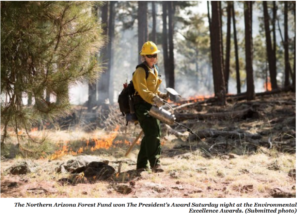 Sustainability Champion and Waste Reduction – made their debuts. Northern Arizona national forests provide the majority of water to the Salt and Verde rivers and eventually into the homes of millions of Phoenix-area residents.
Sustainability Champion and Waste Reduction – made their debuts. Northern Arizona national forests provide the majority of water to the Salt and Verde rivers and eventually into the homes of millions of Phoenix-area residents.
“But the health of the forests and watersheds is threatened,” according to a release announcing the winners. “The Northern Arizona Forest Fund was created to address these declining forest health conditions. To date, the Northern Arizona Forest Fund has completed over 10,000 acres of projects, reducing severe fire risk by about 25 percent.”
The Arizona Pure Water Brew Challenge overturned a long-standing legal prohibition against potable water reuse. It also used craft beer to educate the public about the benefits of the “toilet to tap” revolution, the release stated. The team took to festivals, conferences, parades and expos to get their message out, which resulted in changing a law.
Arizona Forward celebrated the 38th anniversary of its signature awards program, drawing more than 500 social influencers and innovators representing public and private sector interests.
“I’ve attended the Environmental Excellence Awards as an Arizona Forward member for 20 years, and this year’s finalists show how far sustainability has come during that time,” stated Lori Singleton, Arizona Forward president and CEO. “Every year, we see a wider range of entries that make our communities healthier, more vibrant and more resilient.”
Finalist projects were submitted by Maricopa and Pima counties, as well as Chandler, Flagstaff, Glendale, Peoria, Phoenix, Mesa, Tempe, Tolleson and Tucson. “The results of this year’s competition reflect visionary efforts in both the public and private sector,” said lead judge John Flicker, who serves as president of Prescott College. “The judging panel had the diverse knowledge to evaluate how these projects will impact their communities well into the future. It was an honor for us to be part of this process.”
In addition to the Northern Arizona Forest Fund and the Arizona Pure Water Brew Challenge, Crescordia winners include:
WURTH HOUSE (Kimber Lanning) – Buildings and Structures (Civic and Historic Preservation)
Local First Arizona founder Kimber Lanning saved a bungalow that was slated for demolition and gave it new life as the Local First Arizona headquarters. The process took more than three years to complete. Today, more than 30,000 people see the restored bungalow during monthly First Friday events.
OCOTILLO RESTAURANT (TRUEFORM landscape architecture studio) – Buildings and Structures (Commercial and Institutional)
The Ocotillo Restaurant features desert-adaptive materials and water-harvesting elements that blend into the Southwest. Desert palo brea and mesquite trees provide shade, while the restaurant’s namesake ocotillo plants are featured at key locations. A sunken lawn provides a gathering place and harvests water.
NORTHERN ARIZONA POLLINATOR HABITAT INITIATIVE (Green NAU)– Site Development and Landscape (Landscape and Preserves)
The Northern Arizona Pollinator Habitat Initiative promotes the creation, protection and registration of pollinator habitat across Northern Arizona, while highlighting the important role pollinators fulfill in the global food supply. The effort increased local pollinator garden registration tenfold in its first year.
SPACES OF OPPORTUNITY (Orcutt Winslow) – Healthy Communities (Sustainable Communities)
Spaces of Opportunity addresses community connections, food deserts and social justice and allows residents to learn about science, technology, engineering and agriculture. The incubator farm encompasses 3,000 square feet; kale, mustard greens and beets have sprouted this year.
MESA RIO SALADO – STADIUM CONNECTOR PATHWAY (City of Mesa – Engineering Department) – Healthy Communities (Multimodal Transportation and Connectivity)
The Mesa Rio Salado-Stadium Connector Pathway filled a 3.5-mile gap in the Valley’s network of shared-use paths along the Salt River, Crosscut Canal and adjacent neighborhoods. Community partners include the Chicago Cubs, Oakland A’s, Riverview Development, SRP, Arizona Department of Transportation, Flood Control District of Maricopa County, United States Army Corps of Engineers, Salt River Pima-Maricopa Indian Community and the cities of Mesa and Tempe.
SOUTH MOUNTAIN PARK AND PRESERVE TRAILS MASTER PLAN (City of Phoenix Parks and Recreation Department) – Healthy Communities (Public Policy/Plans)
The South Mountain Park and Preserve Plan will help the desert mountain preserve address the challenges of increasing popularity so future generations can connect with the desert. The plan identifies 51 miles of existing designated trails to be protected or improved and adopts 38 miles of existing non-designated trails into the designated trail system.
U-HAUL – THE CONSERVATION FUND: UPPER GRANITE CREEK ASPEN RESTORATION PROJECT (U-Haul International) – Healthy Communities (Parks and Trails)
U-Haul designated a portion of customer contributions in 2017-18 to the National Forest Foundation to support its Prescott Aspen Restoration Project in the Prescott National Forest. One-hundred-fifty acres across two aspen stands were restored, protecting a watershed.
PEORIA POLICE PATROL SERVICES BUILDING (Energy Systems Design, Inc.) – Energy and Technology Innovation
The city of Peoria’s new Patrol Services Building provides an immediate return on investment through ongoing water and energy reduction while providing a comfortable work environment for Peoria’s officers and staff. The building’s energy costs will be 41 percent less than a typical building, and it is tracking LEED Gold certification.
GLENDALE DESERT FOOD FOREST (City of Glendale Water Services Department) – Environmental Education and Communication
Part regenerative landscape and part outdoor classroom, the Glendale Desert Food Forest connects residents to the Sonoran Desert’s array of water-wise edible plants. It includes more than 100 edible plants and involves partners such as the Glendale Public Library, Linking Edible Arizona Forests Network, Maricopa County Master Gardener program and Trees Matter.
GREG STANTON (Greg Stanton Supporters) – Sustainability Champion (Individuals)
Phoenix Mayor Greg Stanton worked to establish Phoenix as an oasis of pragmatic, economically beneficial environmentalism. He asked Phoenix voters to approve a tax increase to benefit mass transit while running for his own re-election, while also converting 100,000 Phoenix streetlights to efficient LED bulbs. Mr. Stanton was also instrumental in developing public-private circular economy partnership through ASU to raise landfill diversion to 30 percent.
COMPLETE LIST OF 2018 WINNERS
GOVERNOR’S AWARD FOR ARIZONA’S FUTURE
CRESCORDIA
Arizona Pure Water Brew Challenge
Submitted by: Pima County Regional Wastewater Reclamation Department
AWARD OF DISTINCTION
RISN Incubator – A partnership between the City of Phoenix and ASU
Submitted by: ASU Rob and Melanie Walton Sustainability Solutions Initiative
AWARD OF DISTINCTION
Salt and Verde Alliance
Submitted by: The Nature Conservancy
BUILDINGS AND STRUCTURES
Civic
AWARD OF DISTINCTION
LEED Gold Tolleson Fire Station + Administration Building
Submitted by: LEA-Architects, LLC
BUILDINGS AND STRUCTURES
Historic Preservation
CRESCORDIA
Wurth House
Submitted by: Kimber Lanning
AWARD OF DISTINCTION
South Mountain Park and Preserve Big Ramada
Submitted by: City of Phoenix Parks and Recreation Department
BUILDINGS AND STRUCTURES
Commercial & Institutional
CRESCORDIA
Ocotillo Restaurant
Submitted by: TRUEFORM landscape architecture studio
AWARD OF DISTINCTION
Arizona State University – Biodesign Institute C
Submitted by: McCarthy Building Companies, Inc.
SITE DEVELOPMENT AND LANDSCAPE
CRESCORDIA
Northern Arizona Pollinator Habitat Initiative
Submitted by: Green NAU
CRESCORDIA
Tohono Chul Park Master Plan
Submitted by: John Douglas Architects
AWARD OF DISTINCTION
Renaissance Phoenix Downtown Hotel
Submitted by: TRUEFORM landscape architecture studio
HEALTHY COMMUNITIES
Sustainable Communities
CRESCORDIA
Spaces of Opportunity
Submitted by: Orcutt Winslow
AWARD OF DINSTINCTION
Downtown Chandler Infrastructure Improvements: Commonwealth Avenue and Dakota Street Extension
Submitted by: Achen-Gardner Constructions, LLC
HEALTHY COMMUNITIES
Multimodal Transportation and Connectivity
CRESCORDIA
Mesa Rio Salado – Stadium Connector Pathway
Submitted by: City of Mesa – Engineering Department
AWARD OF DISTINCTION
Tempe Bike Share Program
Submitted by: City of Tempe
HEALTHY COMMUNITIES
Public Policy/Plans
CRESCORDIA
South Mountain Park and Preserve Trail Master Plan
Submitted by: City of Phoenix Parks and Recreation
HEALTHY COMMUNITIES
Sustainable Workplaces
AWARD OF DISTINCTION
Orcutt Winslow Office
Submitted by: Orcutt Winslow
AWARD OF DISTINCTION
CBRE Phoenix Workplace 360
Submitted by: Gensler
HEALTHY COMMUNITIES
Parks and Trails
CRESCORDIA
U-Haul – The Conservation Fund (TCF): Upper Granite Creek Aspen Restoration Project
Submitted by: U-Haul International
AWARD OF DISTINCTION
Pioneer Park
Submitted by: Dig Studio, Inc.
ENERGY AND TECHNOLOGY INNOVATION
CRESCORDIA
Peoria Police Patrol Services Building
Submitted by: Energy Systems Design, Inc.
ART IN PUBLIC PLACES
AWARD OF DISTINCTION
El Paso Greenway Project
Submitted by: Pima County Regional Wastewater Reclamation Department
ENVIRONMENTAL EDUCATION & COMMUNICATION
CRESCORDIA
Glendale Desert Food Forest
Submitted by: City of Glendale Water Services Department
AWARD OF DISTINCTION
“Up in the Air” an Air Pollution Education Program
Submitted by: Maricopa County Air Quality Department
AWARD OF DISTINCTION
Master Recycler Program
Submitted by: City of Flagstaff Sustainability Section
SUSTAINABILITY CHAMPION
Organizations and Projects
CRESCORDIA
Northern Arizona Forest Fund
Submitted by: National Forest Foundation
AWARD OF DISTINCTION
Arizona Pure Water Brew Challenge
Submitted by: Pima County Regional Wastewater Reclamation Department
SUSTAINABILITY CHAMPION
Individuals
CRESCORDIA
Greg Stanton, Sustainability Champion
Submitted by: Greg Stanton Supporters
AWARD OF DISTINCTION
Bill Auberle
Submitted by: Pinyon Environmental, Audubon Arizona, Northern Arizona University
AWARD OF DISTINCTION
U-Haul Sustainability Champion: Alexia Bednarz
Submitted by: U-Haul International
AWARD OF DISTINCTION
Tim Thomure, Director, Tucson Water
Submitted by: Tucson Water
WASTE REDUCTION
CRESCORDIA
Waste Management Phoenix Open
Submitted by: Waste Management of Arizona
AWARD OF DISTINCTION
Global Water Resources – Total Water Management
Submitted by: Global Water Resources
AWARD OF DISTINCTION
Barley to Beer: Saving the Verde River
Submitted by: The Nature Conservancy (TNC)
PRESIDENT’S AWARD
Northern Arizona Forest Fund
Submitted by: National Forest Foundation
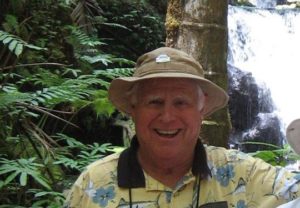 Director Sue Black on leave. There’s more to the story. Following the Arizona Republic’s Oct. 29 report that archaeological sites in state parks have been bulldozed to make way for cabins to generate additional revenue, four Native American state legislators requested a criminal investigation to determine whether state and federal laws were violated.
Director Sue Black on leave. There’s more to the story. Following the Arizona Republic’s Oct. 29 report that archaeological sites in state parks have been bulldozed to make way for cabins to generate additional revenue, four Native American state legislators requested a criminal investigation to determine whether state and federal laws were violated.
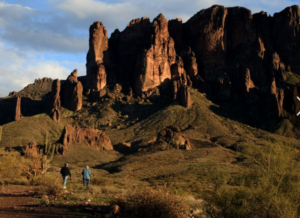
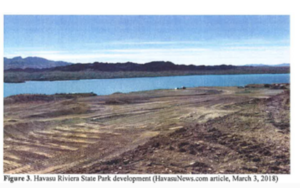


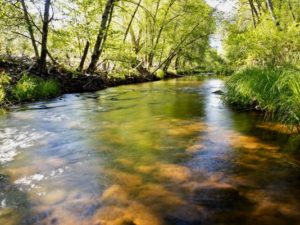
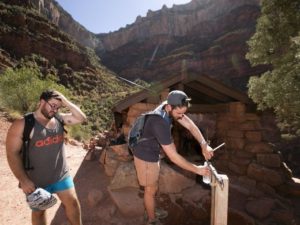
You must be logged in to post a comment.